| Source (Hebrew) | Translation (Greek) |
|---|---|
אֲדוֹן עוֹלָם אֲשֶׁר מָלַךְ. בְּטֶרֶם כָּל יְצִיר נִבְרָא׃ לְעֵת נַעֲשָׂה כְּחֶפְצוֹ כֹּל. אֲזַי מֶלֶךְ שְׁמוֹ נִקְרָא׃ |
Ὁ Κύριος τοῦ κόσμου, ὁ βασιλεύων πρὸ τῆς τοῦ παντὸς δημιουργίας, ἀφοῦ κατὰ τὸ θέλημά του ἐποίησε τὸ πᾶν, μέ τ’ ὄνομα βασιλέως ἐκλήθη. |
וְאַחֲרֵי כִּכְלוֹת הַכֹּל. לְבַדּוֹ יִמְלוֹךְ נוֹרָא׃ וְהוּא הָיָה וְהוּא הֹוֶה. וְהוּא יִהְיֶה בְּתִפְאָרָה׃ |
Καὶ ἀφοῦ τὸ πᾶν θὰ λάβῃ τέλος, αὐτὸς μόνος θὰ βασιλεύῃ ἐσαεὶ ἰσχυρός. Αὐτὸς ἦτο—εἶναι— καὶ ἔσεται ἐν τῇ δόξῃ αὐτοῦ. |
וְהוּא אֶחָד וְאֵין שֵׁנִי. לְהַמְשִׁילוֹ לְהַחְבִּירָה׃ וְהוּא רִאשׁוֹן וְהוּא אַחֲרוֹן. לְכָל חוֹמֶר וּלְכָל צוּרָה׃ |
Αὐτὸς εἶναι Μόνος, καὶ οὐδεὶς ἕτερος δύναται νὰ ἐξομοιωθῇ μὲ αὐτόν. |
בְּלִי רֵאשִׁית בְּלִי תַכְלִית. וְלוֹ הָעוֹז וְהַמִּשְׂרָה׃ בְּלִי עֶרֶךְ בְּלִי דִמְיוֹן. בְּלִי שִׁנּוּי וּתְמוּרָה׃ |
Οὐδ’ ἀρχὴν ἔλαβεν, οὐδὲ τέλος θὰ λάβῃ. Αὐτῷ εἶναι ἡ ἰσχὺς, Αὐτῷ ἡ δύναμις. Οὐδὲ συμπαραβολὴν, οὐδὲ σύγκρισιν ἔχει, οὔτε ἀλλοίωσιν ἢ μεταβολήν. |
בְּלִי חִבּוּר בְּלִי פִרוּד. גְּדוֹל כֹּחַ וּגְבוּרָה׃ וְהוּא אֵלִי וְחַי גּוֹאֲלִי. וְצוּר חֶבְלִי בְּיוֹם צָרָה׃ |
Εἰς αὐτὸν δὲν ὑπάρχει σύνθεσις οὔτε διαίρεσις. Μέγας ἐν ἰσχύϊ εἶναι, μέγας ἐν δυνάμει. Αὐτὸς εἶναι ὁ Θεός μου, ὁ ἀείζωος σωτήρ μου, καὶ ἐν ἡμέραις πονηραῖς ὁ ὑπερασπιστής μου. |
וְהוּא נִסִּי וּמָנוּסִי. מְנָת כּוֹסִי בְּיוֹם אֶקְרָא׃ וְהוּא רוֹפֵא וְהוּא מַרְפֵּא. וְהוּא צוֹפֶה וְהוּא עֶזְרָה׃ |
Σημαία μου εἶναι Αὐτὸς καὶ καταφυγή μου, ἐλπὶς καὶ παρηγορία ἐν ᾗ ἡμέρᾳ ἐπικαλεσθῶ αὐτόν. |
בְּיָדוֹ אַפְקִיד רוּחִי. בְּעֵת אִישָׁן וְאָעִירָה׃ וְעִם רוּחִי גְוִיָּתִי. אֲדֹנָי לִי וְלֹא אִירָא׃ |
Εἰς χεῖράς του παρατίθημι τὸ πνεῦμά μου ὅταν κοιμῶμαι καὶ ἀφοῦ ἐξυπνήσω. Καὶ μετὰ τοῦ πνεύματος εἰς αὐτὸν ἐμπιστεύομαι καὶ τὸ σῶμα. Ὁ Θεὸς ὑπερασπιστής μου, οὐδένα φοβοῦμαι. |
This is Yosef Naḥmuli’s Greek translation of Adon Olam from his bilingual Hebrew-Greek everyday siddur, Καθημεριναι Προσευχαι (Corfu 1885), p. 6-9. I have set the translation side-by-side with the Hebrew text from which it was derived. It seems to me that here, a couple of lines are paraphrase and do not receive full attention.
Adon Olam is a piyyut that became popular in the 15th century and is often attributed to Solomon ibn Gabirol (1021–1058) and less often to Sherira Gaon (900-1001), or his son, Hai ben Sherira Gaon (939-1038). The variation of the piyyut appearing here is the six stanzas version familiar to Sepharadi congregations. (There are also some slightly longer variants found in other Sepharadi siddurim. The Ashkenazi version has ten lines.)
Source(s)


“אֲדוֹן עוֹלָם (מנהג הספרדים) | Αδὸν Ὀλὰμ | Adōn Olam (Greek translation by Yosef Naḥmuli, 1885)” is shared through the Open Siddur Project with a Creative Commons Public Domain Dedication 1.0 Universal license.

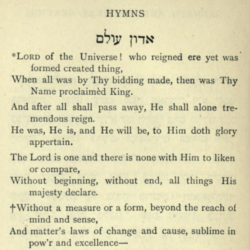
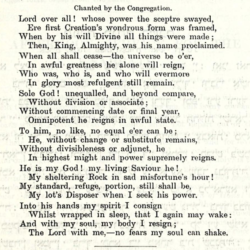
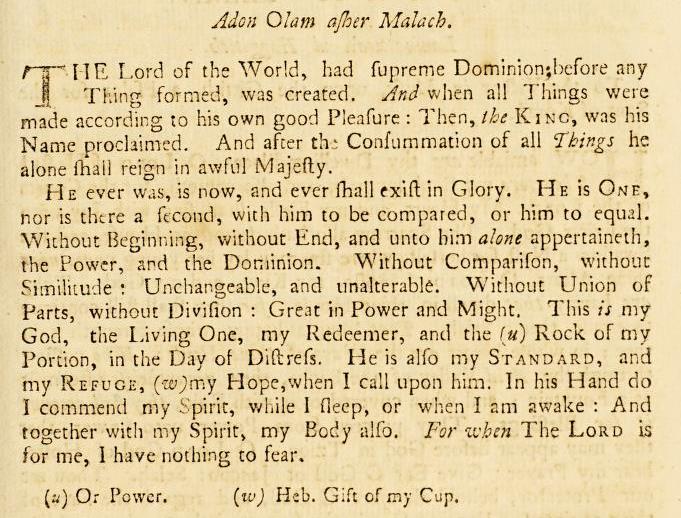

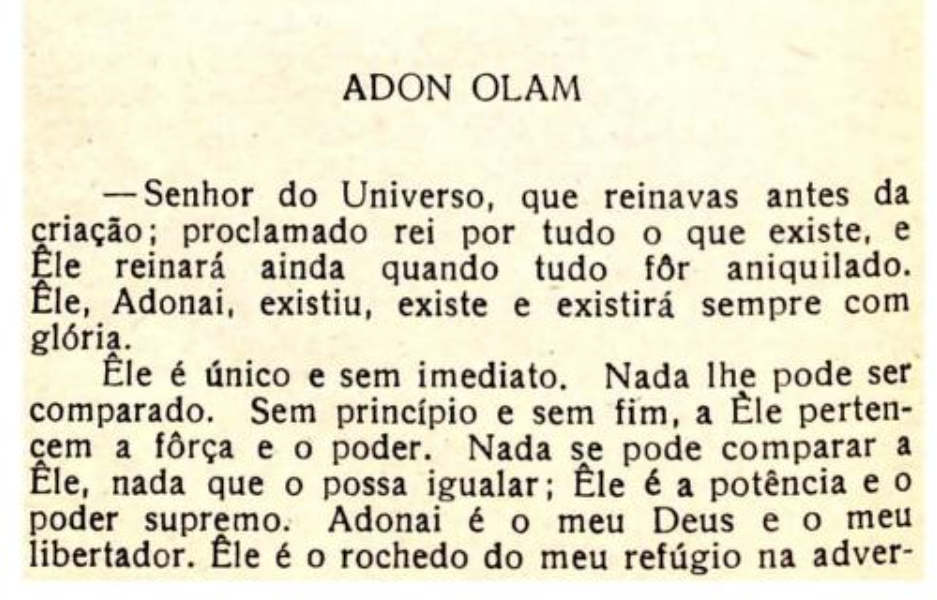
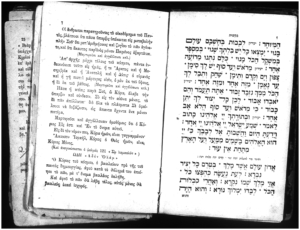


Comments, Corrections, and Queries